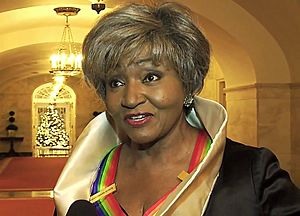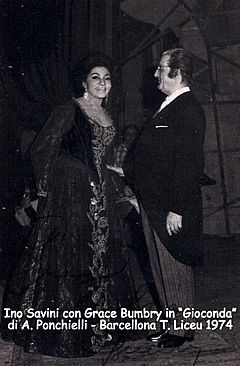Grace Bumbry facts for kids
Quick facts for kids
Grace Bumbry
|
|
|---|---|

Bumbry at the White House for the 2009 Kennedy Center Honors
|
|
| Born |
Grace Melzia Bumbry
January 4, 1937 St. Louis, Missouri, U.S.
|
| Died | May 7, 2023 (aged 86) Vienna, Austria
|
| Occupation | Opera singer |
| Years active | 1958–2023 |
| Spouse(s) |
Edwin Jaeckel
(m. 1963; div. 1972) |
| Awards | |
Grace Ann Melzia Bumbry (born January 4, 1937 – died May 7, 2023) was an amazing American opera singer. She was known for her powerful voice and was one of the best mezzo-sopranos (a type of female singing voice, lower than a soprano) of her time. She also sang many soprano roles (a higher female singing voice).
Grace Bumbry was one of the first African-American classical singers to become famous worldwide. She followed in the footsteps of Marian Anderson, another pioneering singer. Grace Bumbry became internationally recognized in 1961. This was when she performed at the Bayreuth Festival in Germany, a very famous opera festival. She was the first black singer to perform there, which was a huge step forward.
Her voice was rich and strong, with a wide range. She could sing both very high and very low notes. She was also known for her fiery personality and strong acting on stage. Later in her career, she also became known for singing lieder (German art songs) and for teaching other singers. She spent her later years living in Europe, especially in Vienna, Austria.
Contents
Early Life and Education
Grace Ann Melzia Bumbry was born in St. Louis, Missouri, on January 4, 1937. She was the third of four children. Her father, Benjamin Bumbry, worked for the railroad. Her mother, Melzia Bumbry, was a teacher. Her family was religious and loved music.
Grace started playing classical piano when she was seven. But she decided she wanted to be a singer after seeing Marian Anderson perform. She joined her church choir at age 12. She also sang as a soloist in a school play of Handel's Messiah. She listened to Marian Anderson's recordings often. She was also inspired by the St. Louis Symphony Orchestra.
Grace graduated from Charles Sumner High School. This was the first black high school west of the Mississippi River. She later said her voice teachers, Kenneth Billups and Armand Tokatyan, helped her become a great singer.
When she was 17, her teachers encouraged her to enter a talent contest. She won first place, which included a scholarship to the St. Louis Institute of Music. However, the school was segregated, meaning black and white students were kept separate. Her parents refused the offer of private lessons because of this.
The contest organizers then arranged for her to appear on a national TV show called Talent Scouts. She sang a famous opera song, "O don fatale." Her performance was so moving that the host cried. This led to her studying at Boston University College of Fine Arts. She later moved to Northwestern University. There, she met Lotte Lehmann, a famous German opera singer. Lehmann was very impressed and invited Grace to study with her in California. Grace studied with Lehmann for several years, learning about singing, piano, and languages. Lehmann became her mentor.
Opera Career
In 1958, Grace Bumbry won the Metropolitan Opera National Council Auditions. This was a big competition for young opera singers. Later that year, she performed her first concert in Paris, France. Her first opera performance was in 1960. She sang the role of Amneris in Verdi's Aida at the Paris Opéra. That same year, she joined the Basel Opera in Switzerland, where she sang for four years. Some of her roles there included Carmen, Dalila, Orfeo, and Lady Macbeth.
Becoming Famous Worldwide
Grace Bumbry became very famous in 1961. This was when Wieland Wagner, the grandson of the famous composer Richard Wagner, chose her for a role. She sang Venus in Wagner's opera Tannhäuser at the Bayreuth Festival. She was only 24 years old and the first black singer to perform there. This earned her the nickname "Black Venus."
Her performance was a huge sensation. Some traditional opera fans were upset at first. But Grace's singing was so powerful that she won over the audience. They applauded for 30 minutes after the show, and she had to take 42 curtain calls!
This event made Grace Bumbry an international star. In 1962, Jacqueline Kennedy, the First Lady, invited her to sing at the White House. She returned to the White House in 1981 to sing at Ronald Reagan's inauguration.
In 1963, she made her debut at the Royal Opera House in London. She sang Eboli in Verdi's Don Carlo. In 1964, she performed for the first time at La Scala in Italy, and at the Vienna State Opera. She made her debut at the Metropolitan Opera in New York City in 1965, also as Eboli. Critics praised her beautiful singing and dramatic acting.
In 1966, she sang the lead role in Carmen in two different famous productions. She also performed in other major mezzo-soprano roles like Hérodiade and Ulrica.
Singing Soprano Roles
In the 1970s, Grace Bumbry started taking on soprano roles. Her first official soprano role was Salome in Richard Strauss's opera Salome in London in 1970. She first sang Puccini's Tosca at the Metropolitan Opera in 1971. Later, she sang roles like Leonora in Il trovatore and Bess in Porgy and Bess. She also sang more unusual roles like Jenůfa and Ariane.
She also took on roles like Abigaille in Verdi's Nabucco and La Gioconda. Other important soprano roles included Chimène in Le Cid and Elisabeth in Tannhäuser.
Later Career
In the 1990s, Grace Bumbry started the Grace Bumbry Black Musical Heritage Ensemble. This group worked to keep traditional Negro spirituals alive and perform them. She then focused on teaching, judging singing competitions, and giving concerts. In 2001 and 2002, she gave a series of concerts to honor her teacher, Lotte Lehmann.
After many years away from the opera stage, she performed in Scott Joplin's Treemonisha in Paris in 2010. She also appeared in Candide in Berlin in 2012. Her final opera performance was in 2013, as the Countess in Tchaikovsky's Pique dame in Vienna.
Grace Bumbry often gave advice to young singers. She told them: "Always try to be excellent. If you aim for excellence, it means you are determined. You will find a way to reach your goal, even if it means saying no to some great offers. You have to be okay with that, just like you have to be okay with yourself."
Personal Life
In 1963, Grace Bumbry married Erwin Jaeckel, a tenor singer. They divorced in 1972. Her partner, Jack Lunzer, passed away in 2016.
On October 20, 2022, Grace Bumbry had a stroke while on a flight. Her health declined after that. She passed away from complications related to the stroke in a hospital in Vienna on May 7, 2023, at the age of 86.
Vocal Journey
Grace Bumbry had a long and amazing career in opera. She started as a mezzo-soprano, singing lower female roles. But later, she added many dramatic soprano roles to her performances. In the mid-1970s and 1980s, she thought of herself as a soprano. However, in the 1990s, as her career neared its end, she often returned to mezzo-soprano roles.
She was one of the most successful singers to switch from mezzo-soprano to soprano. However, some people debated if she was a "true" soprano. Still, she sang major soprano roles at most of the world's biggest opera houses until her opera career ended in the 1990s. Her main opera career lasted from 1960 to 1997.
Recordings and Honors
Grace Bumbry made many recordings throughout her career. Her earliest recordings were of oratorios (large musical works for orchestra, choir, and soloists) in the late 1950s. She also recorded Handel's Messiah.
Many of her recordings are from her mezzo-soprano period. These include two recordings of Carmen and roles like Amneris, Venus, Eboli, and Lady Macbeth. She also recorded music for the musical Carmen Jones.
Grace Bumbry received many awards and honors. She was added to the St. Louis Walk of Fame. She also received the UNESCO Award and Italy's Premio Giuseppe Verdi. The French government named her a "Commandeur des Arts et Lettres," which is a high honor for artists. In 1972, she won a Grammy Award for Best Opera Recording. On December 6, 2009, she was honored with the Kennedy Center Honors for her contributions to the performing arts.
In 2021, she paid tribute to her friend, opera singer Justino Díaz, at the Kennedy Center Honors.
Images for kids
See also
 In Spanish: Grace Bumbry para niños
In Spanish: Grace Bumbry para niños
 | James Van Der Zee |
 | Alma Thomas |
 | Ellis Wilson |
 | Margaret Taylor-Burroughs |



